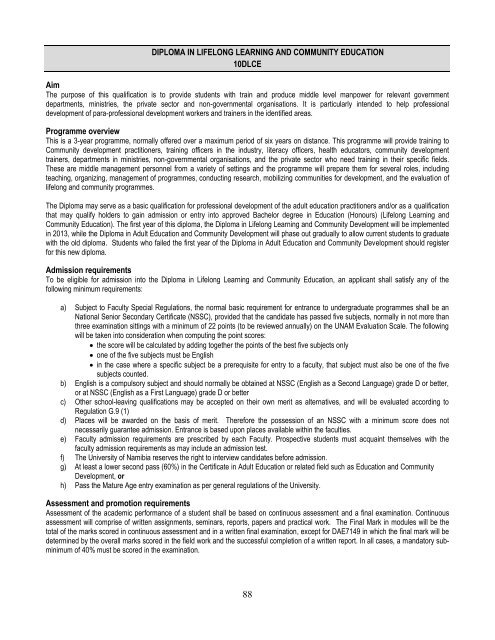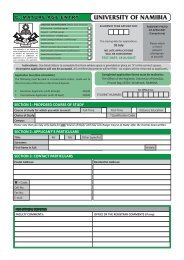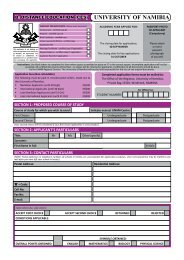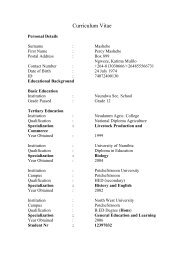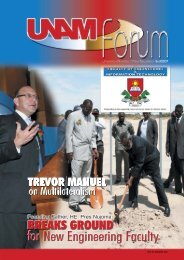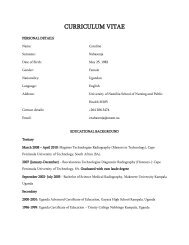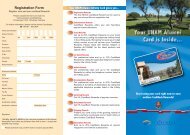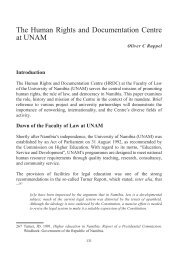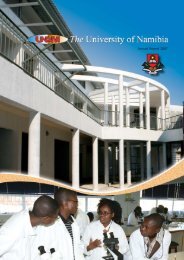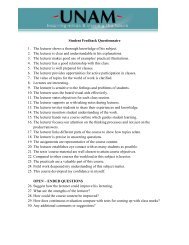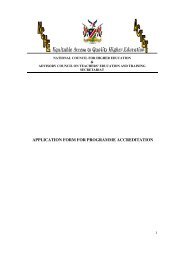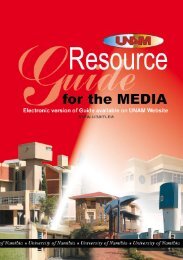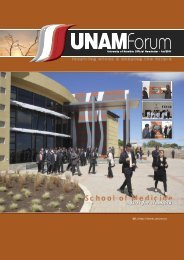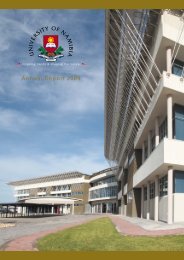UNIVERSITY OF NAMIBIA CENTRE FOR EXTERNAL STUDIES ...
UNIVERSITY OF NAMIBIA CENTRE FOR EXTERNAL STUDIES ...
UNIVERSITY OF NAMIBIA CENTRE FOR EXTERNAL STUDIES ...
Create successful ePaper yourself
Turn your PDF publications into a flip-book with our unique Google optimized e-Paper software.
DIPLOMA IN LIFELONG LEARNING AND COMMUNITY EDUCATION10DLCEAimThe purpose of this qualification is to provide students with train and produce middle level manpower for relevant governmentdepartments, ministries, the private sector and non-governmental organisations. It is particularly intended to help professionaldevelopment of para-professional development workers and trainers in the identified areas.Programme overviewThis is a 3-year programme, normally offered over a maximum period of six years on distance. This programme will provide training toCommunity development practitioners, training officers in the industry, literacy officers, health educators, community developmenttrainers, departments in ministries, non-governmental organisations, and the private sector who need training in their specific fields.These are middle management personnel from a variety of settings and the programme will prepare them for several roles, includingteaching, organizing, management of programmes, conducting research, mobilizing communities for development, and the evaluation oflifelong and community programmes.The Diploma may serve as a basic qualification for professional development of the adult education practitioners and/or as a qualificationthat may qualify holders to gain admission or entry into approved Bachelor degree in Education (Honours) (Lifelong Learning andCommunity Education). The first year of this diploma, the Diploma in Lifelong Learning and Community Development will be implementedin 2013, while the Diploma in Adult Education and Community Development will phase out gradually to allow current students to graduatewith the old diploma. Students who failed the first year of the Diploma in Adult Education and Community Development should registerfor this new diploma.Admission requirementsTo be eligible for admission into the Diploma in Lifelong Learning and Community Education, an applicant shall satisfy any of thefollowing minimum requirements:a) Subject to Faculty Special Regulations, the normal basic requirement for entrance to undergraduate programmes shall be anNational Senior Secondary Certificate (NSSC), provided that the candidate has passed five subjects, normally in not more thanthree examination sittings with a minimum of 22 points (to be reviewed annually) on the UNAM Evaluation Scale. The followingwill be taken into consideration when computing the point scores: the score will be calculated by adding together the points of the best five subjects only one of the five subjects must be English in the case where a specific subject be a prerequisite for entry to a faculty, that subject must also be one of the fivesubjects counted.b) English is a compulsory subject and should normally be obtained at NSSC (English as a Second Language) grade D or better,or at NSSC (English as a First Language) grade D or betterc) Other school-leaving qualifications may be accepted on their own merit as alternatives, and will be evaluated according toRegulation G.9 (1)d) Places will be awarded on the basis of merit. Therefore the possession of an NSSC with a minimum score does notnecessarily guarantee admission. Entrance is based upon places available within the faculties.e) Faculty admission requirements are prescribed by each Faculty. Prospective students must acquaint themselves with thefaculty admission requirements as may include an admission test.f) The University of Namibia reserves the right to interview candidates before admission.g) At least a lower second pass (60%) in the Certificate in Adult Education or related field such as Education and CommunityDevelopment, orh) Pass the Mature Age entry examination as per general regulations of the University.Assessment and promotion requirementsAssessment of the academic performance of a student shall be based on continuous assessment and a final examination. Continuousassessment will comprise of written assignments, seminars, reports, papers and practical work. The Final Mark in modules will be thetotal of the marks scored in continuous assessment and in a written final examination, except for DAE7149 in which the final mark will bedetermined by the overall marks scored in the field work and the successful completion of a written report. In all cases, a mandatory subminimumof 40% must be scored in the examination.88


